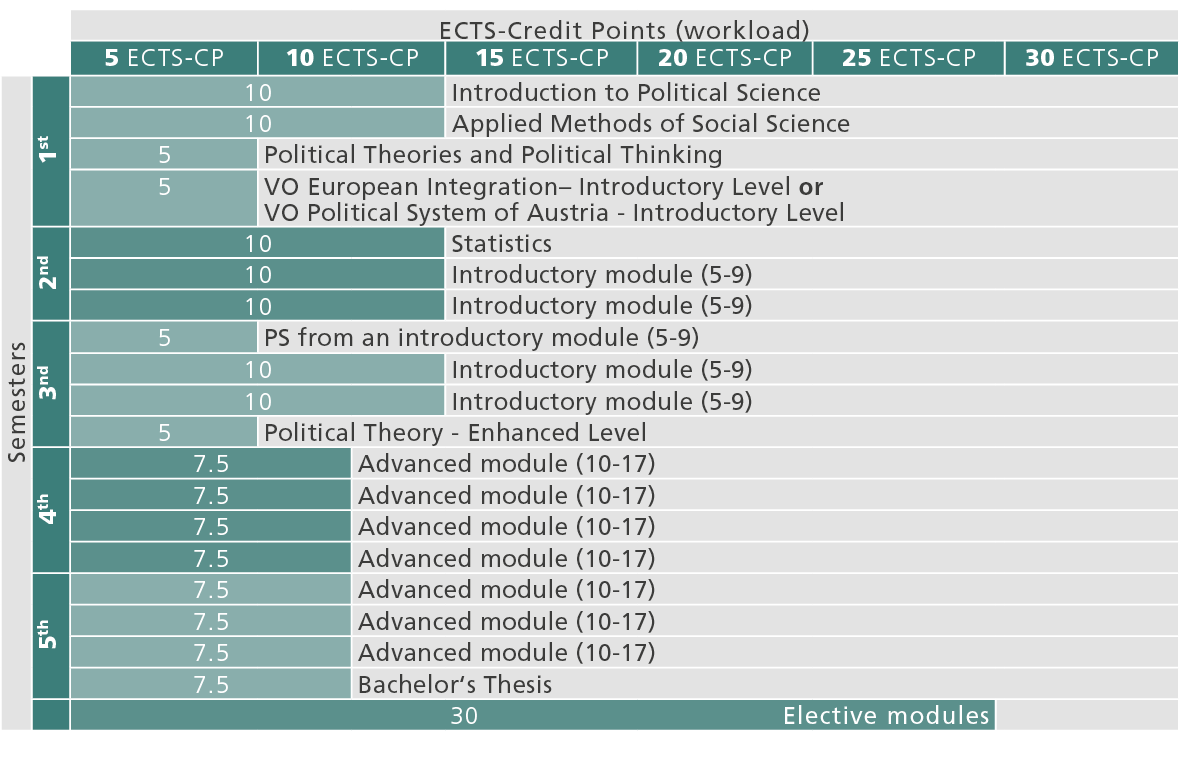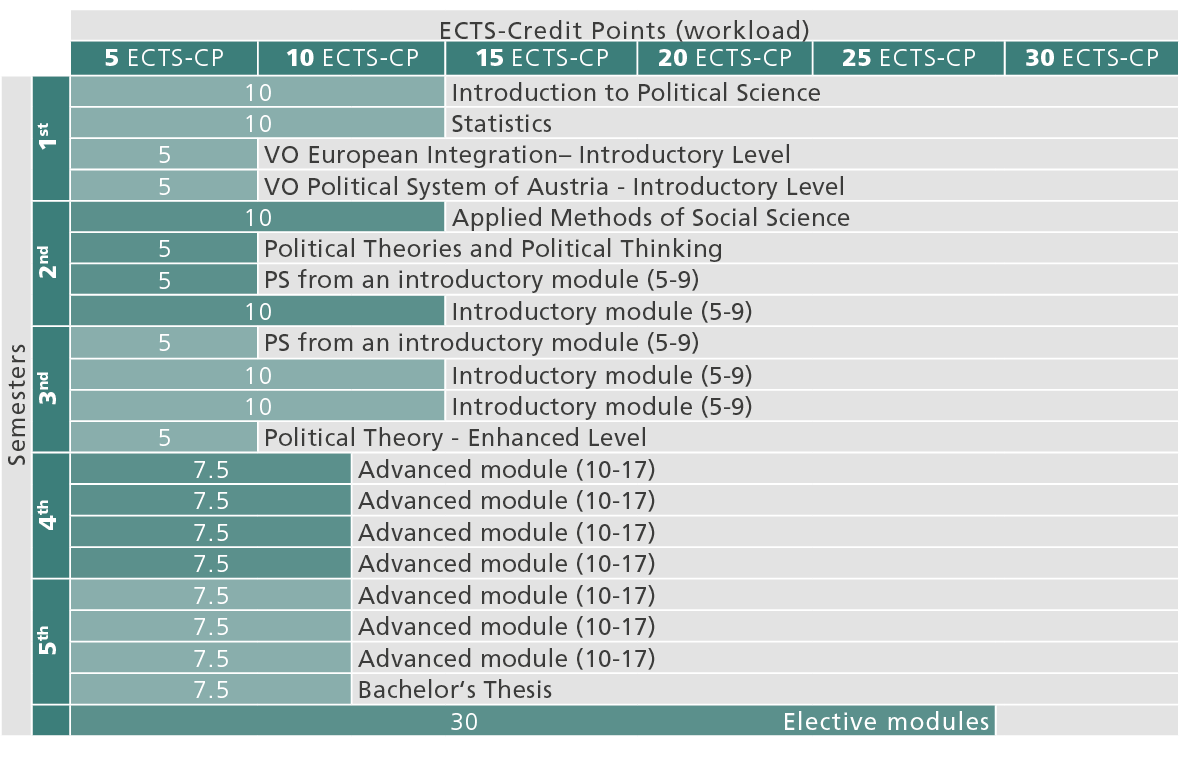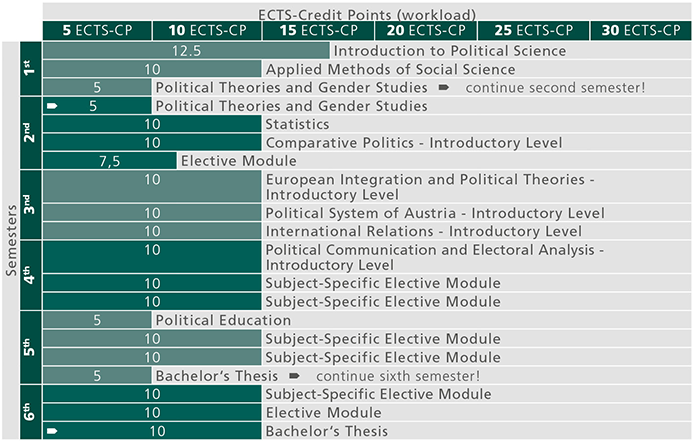Bachelor's Programme Political Science
Curriculum (2007W)
Bachelor of Arts
Duration/ECTS-Credits
6 semesters/180 ECTS-Credits
Mode of Study
Full-time
Language
German
Requirements
Secondary school completion certificate or equivalent and Language Certificates
Faculty
Faculty of Social and Political Science
Level of qualification
Bachelor (1st cycle)
ISCED-11: Level 6, EQF/NQF: Level 6
ISCED-F
0312 Political Sciences and Civics
Study code
UC 033 624
The curriculum is the basis of a degree programme. A look at the curriculum for the Bachelor's Programme Political Science gives you a detailed overview of the structure, content, examination regulations and qualification profile of this Bachelor's degree.
The curriculum can clarify several important questions before you start your studies. For example, which criteria must be fulfilled for enrolment in the Bachelor's Programme Political Science, how long the programme lasts, which modules must be completed and much more.
The 2007W curriculum currently applies to the Bachelor's Programme Political Science.
Information on the Curriculum (2007W)
The complete version of the curriculum the currently valid version of the curriculum. It is for informational purposes only and is not legally binding. The legally binding version of the curriculum, including any amendments, may be found in the University of Innsbruck Bulletins.
In order to determine which version of the curriculum is applicable in your case, see the Catalogue of Studies,
available at: https://lfuonline.uibk.ac.at/public/lfuonline_meinestudien.studienblatt
Section: Current Curriculum version.
- English version of the curriculum (from October 1st 2020)
- University of Innsbruck Bulletin June 3rd 2020, Issue 38, No. 393 (equvalence list)
- University of Innsbruck Bulletin April 30th 2020, Issue 25, No. 347 (modification of the curriculum)
- English version of the curriculum (from October 1st 2017)
- University of Innsbruck Bulletin May 23rd 2017, Issue 40, No. 585 (modification of the curriculum)
- English version of the curriculum (from October 1st 2016)
- University of Innsbruck Bulletin May 2nd 2016, Issue 24, No. 361 (modification of the curriculum)
- English version of the curriculum (from October 1st 2014)
- University of Innsbruck Bulletin September 10th 2014, Issue 46, No. 660 (equivalence list)
- University of Innsbruck Bulletin June 17th 2014, Issue 30, No. 502 (modification of the curriculum)
- Curriculum/Consolidated version (from October 1st 2011)
- University of Innsbruck Bulletin June 8th 2011, Issue 26, No. 441 (modification of the curriculum)
- University of Innsbruck Bulletin June 23rd 2010, Issue 42, No. 334 (modification of the curriculum)
- University of Innsbruck Bulletin September 30th 2009, Issue 113, No. 436 (amendment of the curriculum)
- University of Innsbruck Bulletin April 15th 2009, Issue 65, No. 255 (modification of the curriculum)
- University of Innsbruck Bulletin June 6th 2007, Issue 55, No. 239 (amendment of the curriculum)
- University of Innsbruck Bulletin April 23rd 2007, Issue 37, No. 201
Studies Induction and Orientation Stage (STEOP)
(1) Within the scope of the Studies and Orientation Stage, which takes place in the first semester, the following course examinations must be passed:
- VO Fundamentals of Political Science (CM 1 lit. a, 2 h, 5 ECTS-Credits),
- VO Scientific Working Skills in Political Science (CM 1 lit. b‚ 2 h, 5 ECTS-Credits).
(2) Successful passing of all exams of the Studies Induction and Orientation Stage entitles to passing all further courses and examinations as well as to writing the Bachelor’s Thesis.
(3) Before successful completion of the Studies Induction and Orientation Stage courses amounting to 20 ECTS-Credits may be passed. The requirements specified in the curriculum must be met.
(1) Within the scope of the Studies and Orientation Stage, which takes place in the first semester, the following course examinations must be passed:
- VO Fundamentals of Political Science (CM 1 lit. a, 4 hrs., 7.5 ECTS-Credits),
- VO Scientific Working Skills in Political Science (CM 1 lit. b‚ 2 hrs., 5 ECTS-Credits).
(2) Successful passing of all exams of the Studies Induction and Orientation Stage entitles to passing all further courses and examinations as well as to writing the Bachelor’s Thesis.
(3) Before successful completion of the Studies Induction and Orientation Stage courses amounting to 17.5 ECTS-Credits may be passed. The requirements specified in the curriculum must be met.
Recommended Course Sequence
The exemplary course sequence given below is recommended for full-time students. The table shows one possible course sequence for the bachelor's programme and is not compulsory. Delays resulting from repeated examinations are not taken into account.
The standard duration of the study programme is 6 semesters or 180 ECTS-Credits, whereby according to the Universities Act of 2002, a workload of 1,500 (real) hours per academic year must be fulfilled, corresponding to 60 ECTS-Credits (one ECTS-Credit is equivalent to a workload of 25 hours).
10.0 ECTS-AP: Introduction to Political Science
10.0 ECTS-AP: Applied Methods of Social Science
5.0 ECTS-AP: Political Theories and Political Thinking
5.0 ECTS-AP: VO European Integration– Introductory Level or VO Political System of Austria - Introductory Level
10.0 ECTS-AP: Statistics
10.0 ECTS-AP: Introductory module (5-9)
10.0 ECTS-AP: Introductory module (5-9)
5.0 ECTS-AP: PS from an introductory module (5-9)
10.0 ECTS-AP: Introductory module (5-9)
10.0 ECTS-AP: Introductory module (5-9)
5.0 ECTS-AP: Political Theory - Enhanced Level
7.5 ECTS-AP: Advanced module (10-17)
7.5 ECTS-AP: Advanced module (10-17)
7.5 ECTS-AP: Advanced module (10-17)
7.5 ECTS-AP: Advanced module (10-17)
7.5 ECTS-AP: Advanced module (10-17)
7.5 ECTS-AP: Advanced module (10-17)
7.5 ECTS-AP: Advanced module (10-17)
7.5 ECTS-AP: Bachelor's Thesis
30.0 ECTS-AP: Elective modules

10.0 ECTS-AP: Introduction to Political Science
10.0 ECTS-AP: Statistics
5.0 ECTS-AP: VO European Integration– Introductory Level
5.0 ECTS-AP: VO Political System of Austria - Introductory Level
10.0 ECTS-AP: Applied Methods of Social Science
5.0 ECTS-AP: Political Theories and Political Thinking
5.0 ECTS-AP: PS from an introductory module (5-9)
10.0 ECTS-AP: Introductory module (5-9)
5.0 ECTS-AP: PS from an introductory module (5-9)
10.0 ECTS-AP: Introductory module (5-9)
10.0 ECTS-AP: Introductory module (5-9)
5.0 ECTS-AP: Political Theory - Enhanced Level
7.5 ECTS-AP: Advanced module (10-17)
7.5 ECTS-AP: Advanced module (10-17)
7.5 ECTS-AP: Advanced module (10-17)
7.5 ECTS-AP: Advanced module (10-17)
7.5 ECTS-AP: Advanced module (10-17)
7.5 ECTS-AP: Advanced module (10-17)
7.5 ECTS-AP: Advanced module (10-17)
7.5 ECTS-AP: Bachelor's Thesis
30.0 ECTS-AP: Elective modules

12.5 ECTS-AP: Introduction to Political Science
10.0 ECTS-AP: Applied Methods of Social Science
5.0 ECTS-AP: Political Theories and Gender Studies » continue second semester
5.0 ECTS-AP: Political Theories and Gender Studies
10.0 ECTS-AP: Statistics
10.0 ECTS-AP: Comparative Politics - Introductory Level
7.5 ECTS-AP: Elective Module
10.0 ECTS-AP: European Integration and Political Theories - Introductory Level
10.0 ECTS-AP: Political System of Austria - Introductory Level
10.0 ECTS-AP: International Relations - Introductory Level
10.0 ECTS-AP: Political Communication and Electoral Analysis - Introductory Level
10.0 ECTS-AP: Subject-Specific Elective Module
10.0 ECTS-AP: Subject-Specific Elective Module
5.0 ECTS-AP: Political Education
10.0 ECTS-AP: Subject-Specific Elective Module
10.0 ECTS-AP: Subject-Specific Elective Module
5.0 ECTS-AP: Bachelor's Thesis » continue sixth semester
10.0 ECTS-AP: Subject-Specific Elective Module
10.0 ECTS-AP: Elective Module
10.0 ECTS-AP: Bachelor's Thesis

| Semester | ECTS-AP | Titel |
|---|---|---|
Minor
As part of the Bachelor’s Programme, a Minor of 30 ECTS-Credits can be completed.
More information and a list of possible Minors can be found at:
https://www.uibk.ac.at/studium/angebot/wahlpakete/
Extension Programme
Within the scope of the Study Programme, a Extension Programme corresponding to 60 ECTS-Credits may be passed. Admission to the Extension Programme requires the admission to or the having passed of one of the selected Study Programmes. Detailed information: https://www.uibk.ac.at/studium/angebot/es-informatik/
Political Science in Practice
After successful completion of the compulsory modules 1-9 students can complete the elective module “Political Science in Practice”. For this, no registration in LFU:online online is needed. Further information can be found at: https://www.uibk.ac.at/fakultaeten-servicestelle/pruefungsreferate/37/ba-politikwissenschaft.html#Praxis (currently only in German)
Information about examination regulations, assessment and grading
Examination regulations
The examination regulation is an integral part of the curriculum, detailed information can be found under the paragraph examination regulations.
The grade distribution table is a statistical representation of the distribution of all successfully completed examinations in a given programme of study or subject (based on all registered students for the programme or subject). The grade distribution table is updated in regular intervals.
| A | B | C | D | E |
|---|---|---|---|---|
| Austrian grading scheme | Definition | %-age | ||
| 1 | EXCELLENT: Outstanding performance | 25.3 | = 100% | |
| 2 | GOOD: Generally good, but with some errors | 30.2 | ||
| 3 | SATISFACTORY: Generally sound work with a number of substantial errors | 25.5 | ||
| 4 | SUFFICIENT: Performance meets the minimum criteria | 19 | ||
| 5 | INSUFFICIENT: Substantial improvement necessary; requirement of further work |
December 2021
Overall classification of the qualification
Not applicable
Explanation: An overall classification (mit Auszeichnung bestanden/pass with distinction, bestanden/pass, nicht bestanden/fail) – is awarded only for examinations that conclude a programme of study and consist of more than one subject (an examination of this type is not specified in the curriculum of this programme of study).
Contact and Information
Examination Office
Location Universitätsstraße 15
Associate Dean of Studies
Ass.-Prof. Dr. David Munck Willumsen
Dean of Studies (from 01.03.2024)
Univ.-Prof. Dr. Wilhelmus Johannes Gerardus Uunk
